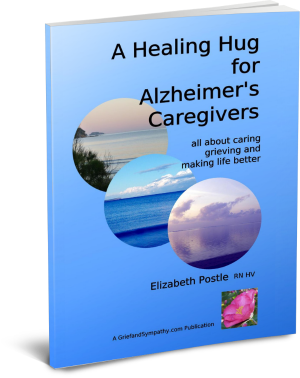Understanding Alzheimer's Behaviour Changes
Help with understanding Alzheimer's behaviour changes for carers at home and in residential settings.
For those dealing with Alzheimer's, or coping with someone with dementia, it can be a very confusing and difficult time. People can develop Alzheimer's as early as their forties and it can be difficult to diagnose in the early stages. Behavioural changes occur, even aggression in a previously calm and kind partner. Depression is often suspected and a specialist psychiatrist is needed for a true diagnosis.
It is extremely difficult if your loved one is the breadwinner and is forgetting their appointments , losing their ability to control their finances, or even getting lost. Other signs include repetitive behaviour or forgetting family names. It can be very stressful if you are still working and need to leave your partner with Alzheimer's at home.
Watch this short video of me explaining Alzheimer's behaviours and what to do:
Understanding Alzheimer’s repetitive behaviour patterns
It may save you some emotional trauma if you can understand some of what seems to be very bizarre behaviour but which makes sense when you comprehend what is actually happening. Understanding Alzheimer's behaviour changes can help you develop coping strategies and activities to keep them occupied and safe.
Some of the early signs of repetitive behaviour may manifest themselves as forgetfulness. Your loved one might say “I'll just get some money out of the bank”. Having got the money, you walk further down the road and they say “I'll just get some money out of the bank”. Alarm bells ring and you wonder what is happening. Or you might be driving along the motorway and they say “Let's stop and fill the car with fuel and get a cuppa”. A few minutes after having stopped they say the same thing again. The memory pathways seem to get stuck or blocked.
Later on, this becomes much more apparent. For example, you ask the loved one to get a towel from the cupboard. Before long, all the contents of the cupboard are on the floor. If you get a towel, your brain tells you to then go and put it in the bathroom or the kitchen. With Alzheimer's the message task pathways seem to get blocked so that they keep getting the towel out of the cupboard over and over again. It's like a record that gets stuck and has to be helped to move on.
If you now suggest putting a towel back in the cupboard, the cupboard will then be filled again for you. There is no point in the reaction “Why have you done that?” They will have no idea that they have done something wrong.
If you go into the kitchen and find everything out of the fridge, they might just have gone in there for some milk. Or the contents of the crockery cupboard are all out because they went for a cup. Your brain would tell you, you've got the cup, now go and get the water, or the tea. Their brain pathway gets stuck on “get a cup” so they continue to empty the cupboard.
All the contents of the wardrobe may end up on the bed when they go to get a cardigan. Or they may end up wearing several cardigans. It seems difficult to understand until you realise that the message pathways get blocked and they continue repeating the behaviour. Choosing what they are going to wear and laying it out on the bed helps.
You can help by calmly moving onto the next task. By suggesting “Let's take off a cardigan, it's hot”. It can seem even more bizarre when you come in from a walk and suggest taking off a coat, and then you realise they have taken all their clothes off.
If you understand why they are doing it, it is easier to cope. You have to be one step ahead and know how to press the stop button, by suggesting new tasks or activities. Finding jobs that are repetitive, like cleaning the brass, or sweeping the leaves can be useful. Simple tasks that they used to like doing. A daily walk can be a good idea.

Alzheimer’s behaviour changes- loss of financial control - avoid telephone sales problems
Another huge concern for families is when the person with Alzheimer's answers selling calls on the phone. Families discover later that their loved one has said yes to timeshare holidays, for example, or other goods they can't afford. Of course the loved one forgets and the family have to cancel orders when the bills come in.
An aunt of my late husband booked her and her husband on a plane trip on the first concord flight! There had been a lot of publicity on the television about London to New York only taking 3 hours. It cost thousands which of course they couldn't afford so the family had to cancel when the bill came.
It is probably a good idea to put some sort of lock on the phone, or unplug it when the person with Alzheimer's is home on their own in the early stages.
Memory loss regarding money and valuables
People with early dementia can’t believe that they are incapable of remembering and will blame family and friends. If they buy things and forget and then realise they have less money in their purse than expected, they will think they have been robbed or will blame friends or family who have visited.
They will give away family items, forget and then accuse the family of stealing.
Valuables should be itemised and preferably kept in a bank. Family members should always discuss what items they have been given.
In a residential setting no valuables should ever be accepted. If a resident ever offers a carer a gift in the home or residential setting the staff manager should immediately be informed and the details noted. Even a box of chocolates. It is sad but loved ones do forget at this stage and accusations can be difficult. Keep the items given to the carer, detail the time and the date and refer to the relatives. It saves all future unpleasantness.
All carers in any setting should be wary of accepting gifts from their clients.
Caring for loved ones and understanding their behavioural changes is not easy.
It all takes a lot of patience and supervision. It's a good idea to get a care plan and day centre care organised. It's important to accept as much help as you can get. Through your doctor you should have a psychiatric assessment and care plan arranged so that you have appropriate support.
Let family and friends do some caring so you can catch up on sleep, have some “me” time. Don't be too proud to ask.
Click on the book for information about my complete guide to Alzheimer's Caregiving:
RElated Pages:
Tips for Alzheimer's Caregivers
7 Warning Signs You Are Grieving for Your Spouse with Alzheimer's
- Grief and Sympathy Home
- Alzheimer's Spouse Grief
- Alzheimer's Behaviour Changes
Keep in touch with us:
Sign up for our newsletter and receive:
"The 10 Most Important Things You Can Do
To Survive Your Grief And Get On With Life"
Our free downloadable and printable document "The 10 Most Important Things You Can Do To Survive Your Grief And Get On With Life" will help you to be positive day to day.
The 10 points are laid out like a poem on two pretty pages which you can pin on your fridge door to help you every day!
All you have to do to receive this free document is fill in your email address below.
You will also receive our newsletter which we send out from time to time with our newest comforting and helpful information. You can unsubscribe any time you like, and don't worry, your email address is totally safe with us.
NEW BONUS - Also receive a copy of our short eBook - '99 Ways to Spot a Great Grief Counselor'. Available for instant download as soon as you sign up. Never waste money on poor counseling again!
